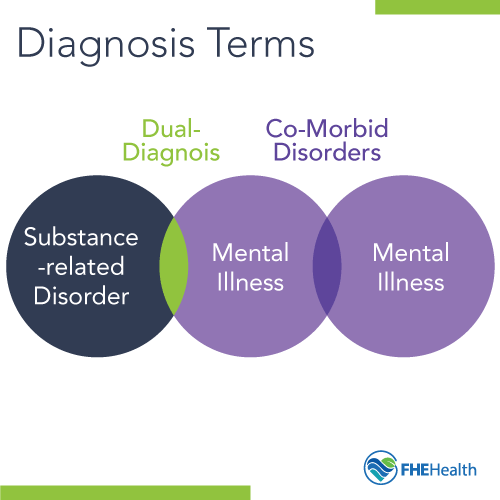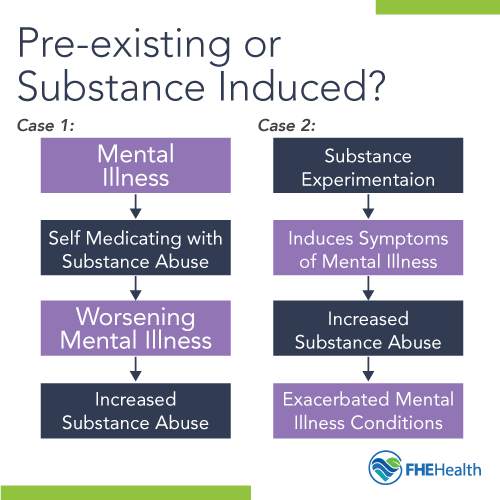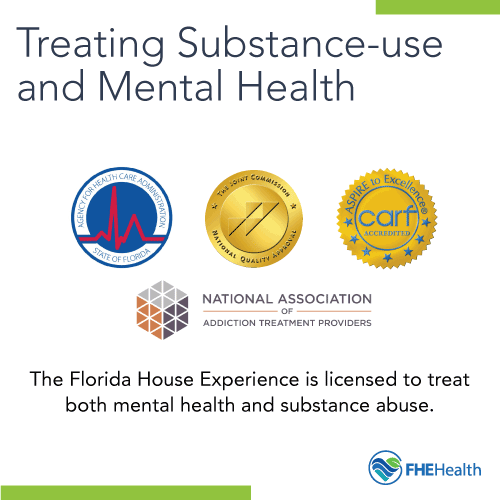Addiction is an extremely difficult challenge regardless of your personal stature or resources. The disease requires a team of specialized interventionists for the best outcomes. However, it can be even more troubling for those who simultaneously suffer from mental health complications. Known as a dual diagnosis, or co-occurring disorders, the combination of mental health problems and substance use disorder is unfortunately common.
At FHE Health in Deerfield Beach, FL, we are committed to providing care to a wide spectrum of patients, from those who use recreationally to those who have fallen into a pattern of abuse in response to struggles like depression, anxiety, or schizophrenia. The dual diagnosis treatment program is designed to provide supportive care to those working to overcome more than just addiction, helping those with co-occurring disorders to find a safe, effective way to approach sobriety.
What Is a Dual Diagnosis?
Simply put, the term dual diagnosis refers to any individual who suffers from both a substance use disorder and a mental health disorder simultaneously. These can occur in any combination; there is no right or wrong way to receive a dual diagnosis, and all forms of addiction and mental health disorders can be interpreted as such. The most common forms of mental illness to present in a dual diagnosis case include:
- PTSD
- Depression
- Anxiety
- Schizophrenia
- Anorexia
- Bulimia
- Bipolar disorder
- Obsessive-compulsive disorder
 For many individuals with a co-occurring disorder, substance use evolves out of a deep desire for normalcy and the use of addictive substances to self-treat. For example, alcohol use can help those with anxiety to temporarily feel less stressed, while chronic marijuana use may alleviate depression symptoms when high. However, this can lead to a troubling cycle of abuse, transforming a coping method into a substance use disorder.
For many individuals with a co-occurring disorder, substance use evolves out of a deep desire for normalcy and the use of addictive substances to self-treat. For example, alcohol use can help those with anxiety to temporarily feel less stressed, while chronic marijuana use may alleviate depression symptoms when high. However, this can lead to a troubling cycle of abuse, transforming a coping method into a substance use disorder.
Co-morbidity is the name for multiple chronic illnesses occurring at the same time. It is not uncommon for someone to suffer from more than one mental illness, but the presence of a substance abuse disorder is what defines them as a dual diagnosis patient.
For these individuals, the journey to sobriety can seem even longer and harder; quitting substances can exacerbate mental illness, yet attempting to treat mental health problems is almost impossible without also addressing addiction.
The Prevalence of Co-Occurring Disorders in the United States
Tragically, a dual diagnosis disorder is not uncommon in the United States. Approximately eight million adults suffer from both a mental illness and a substance use disorder, with more than half of those diagnosed failing to seek treatment. In fact, of those who are living with co-occurring disorders, 34.5% seek treatment for their mental health disorder, 3.9% get help for solely their struggles with addiction, and just 9.1% get help for both.
The reason for avoidance of professional assistance varies, ranging from a fear of admitting the truth to denial of a problem. For 25% of those, however, the issue is simple: they don’t know where to find appropriate health care for both halves of a dual diagnosis. This is possibly due to the under-publicized nature of co-occurring disorders; most individuals who would fit a dual diagnosis don’t know that there is a clinical name for what they are going through. Many people aren’t even sure what to look for when considering local resources.
The connection between mental health problems and substance abuse isn’t a coincidence; those who have mental health disorders are over 50% more likely to abuse substances than those who don’t. This can be attributed to several causes, including the ease of access to addictive substances, the lack of appropriate mental health care in many areas of the country, and the sometimes steep cost barriers involved in working with a professional counselor.

The Treatment of Dual Diagnoses
Seeking rehabilitation for a dual diagnosis is often more challenging than seeking treatment for a standalone substance abuse issue or mental illness. Largely, this is due to the fact that it’s virtually impossible to treat one aspect without addressing the other. To provide appropriate care for those who want to get clean and live a happy, healthy life, it’s very important to target both mental health and substance use in a multi-faceted way.
Which Comes First – Addiction or Mental Illness?
 For some therapists and counselors, treating a dual diagnosis becomes a question of the chicken or the egg, so to speak: which came first? They believe that in order to provide proper care, it’s important to identify the root cause and that treating whichever one came first will lead to automatic improvement in the other. However, this is rarely the case.
For some therapists and counselors, treating a dual diagnosis becomes a question of the chicken or the egg, so to speak: which came first? They believe that in order to provide proper care, it’s important to identify the root cause and that treating whichever one came first will lead to automatic improvement in the other. However, this is rarely the case.
For many people, addiction does indeed follow the symptoms of a mental health disorder, but this isn’t always the progression. Some forms of substance use, like utilizing heavy doses of hallucinogenic drugs, can actually trigger permanent changes in the brain, leading to the onset of conditions like anxiety and even schizophrenia.
While it is extremely important for those addressing dual diagnosis patients to learn patient health and history to best provide a customized approach to treatment, simply targeting one half of a co-occurring disorder will rarely result in lasting progress.
Dual Diagnosis Recovery: The Advantages of a Combined Approach to Treatment
While a standard response to substance abuse rehabilitation may provide temporary relief, it’s unlikely to lead to permanent recovery. As such, most addiction medicine professionals are now advocating a joint treatment method, targeting both addiction and mental illness simultaneously. Rather than treating simply surface symptoms, this form of therapy promotes a comprehensive and well-rounded approach that is designed to target the root of an individual’s challenges.
In addressing dual diagnosis patients, it’s important to identify the drivers behind behavior rather than just isolating the behavior itself. For example, in addition to a clinical diagnosis of a mental health condition, it’s important to target what led to substance use. To alleviate anxiety? To diminish the symptoms of depression? To attempt to hide feelings of isolation of neglect? By getting to the bottom of these experiences and choices, it’s far easier to provide effective coping methods, therapeutic techniques, and psychoanalytical treatment pathways that can than facilitate overall health and wellness.
About FHE Health
At the FHE Health, we are dedicated to providing committed, customized care for those facing a dual diagnosis. We believe in an integrated approach that addresses both mental health and substance abuse treatment, creating an environment that is welcoming, comfortable, and effective. Our rehab center is AHCA-certified, meaning that we are equipped to provide a full range of mental health treatments, for those with and without addiction.
Evaluation from Start to Finish
 From the first moment a patient enters our facility to begin the process of getting well, he will be under the supervision and guidance of both medical and psychological personnel to ensure the perfect approach to detox and treatment. Our psychiatrists and psychologists are highly trained in both addiction medicine and mental health, helping to identify signs of mental illness and providing appropriate responses to both, even during the worst of withdrawal.
From the first moment a patient enters our facility to begin the process of getting well, he will be under the supervision and guidance of both medical and psychological personnel to ensure the perfect approach to detox and treatment. Our psychiatrists and psychologists are highly trained in both addiction medicine and mental health, helping to identify signs of mental illness and providing appropriate responses to both, even during the worst of withdrawal.
We realize that very rarely does someone with a substance use disorder have just one condition, and we are prepared to take all actions necessary to treat every aspect influencing addiction and mental health. That’s why we are consistently focused on all elements that make a difference in the quality of care, from group and individual counseling to the use of medication and psychoanalytic therapy. We are also aware that all of our options are not necessarily right for everyone, which is why we favor a fully customized approach to dual diagnosis recovery.
Individualized Care
As an addiction and mental health treatment facility, we are highly qualified to work with individuals with varying co-occurring disorders, regardless of personal challenges and experiences. We realize that mental illness and substance use disorders affect different people in different ways, and we are committed to finding a path that is right for everyone. To accomplish this, a full medical workup is performed for every patient attending detox and rehabilitation, providing insight into the prior medical history and family history to target the best approach to make a difference.
For those we feel are facing mental health needs primarily, our mental health program can provide intensive therapy and counseling during detox. This offers a solid foundation upon which to influence addiction recovery, making it easier to see improvement in those with a dual diagnosis. Our medical staff works carefully with everyone who enters our programs to find the best starting point possible in order to see significant, sustainable growth and development.
If you are struggling with both substance abuse and mental illness, FHE Health is here to help you make strides physically, mentally, and emotionally. Please contact us today at (833) 596-3502 for immediate assistance regarding mental health rehab, addiction treatment, or both.








